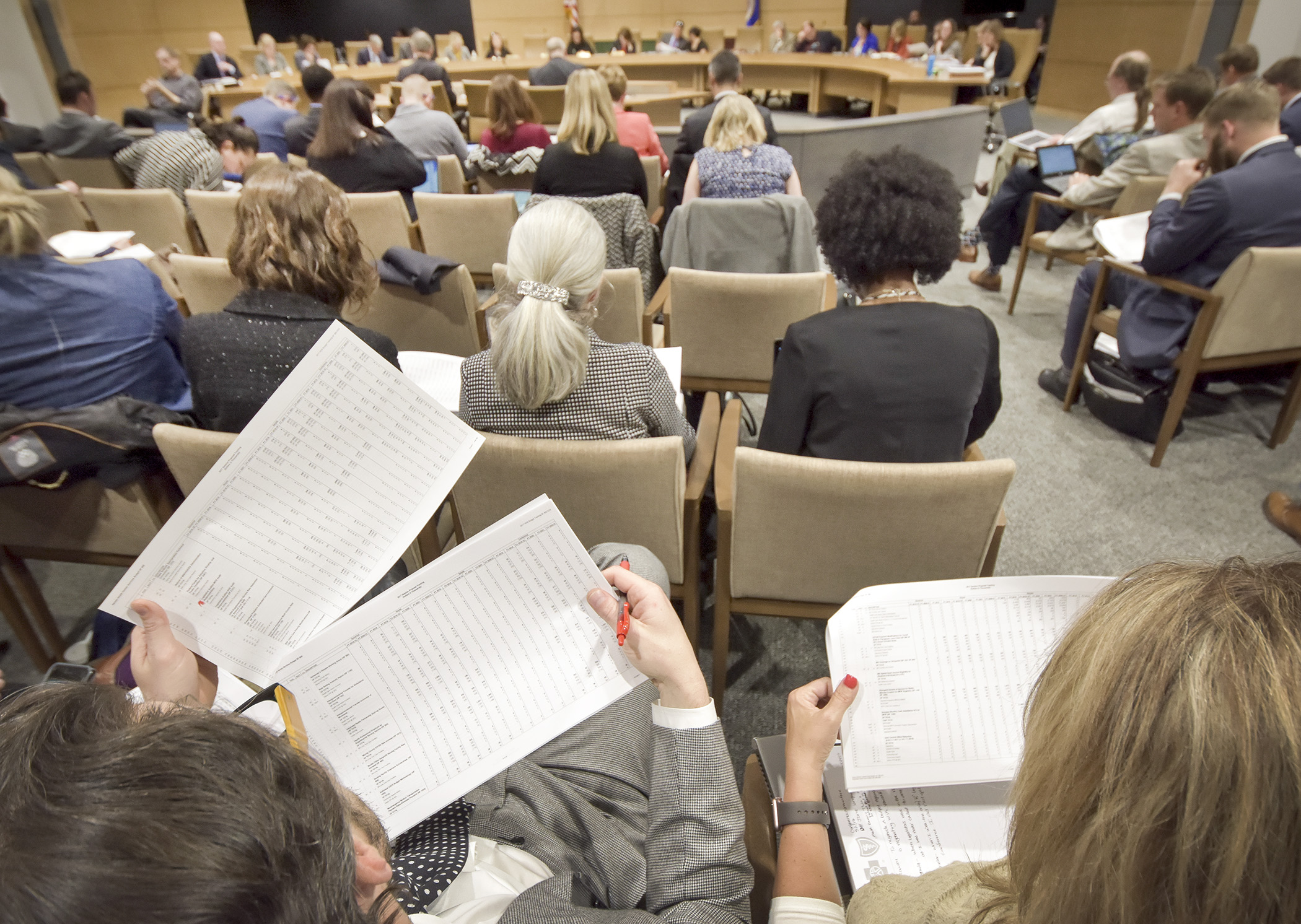Omnibus health and human services bill amended, adopted

Conferees adopted a combined version of the House and Senate omnibus health and human services bills early Monday evening that is expected to cut $482.44 million from projected state spending during the 2018-2019 biennium.
The a 583-page delete-all amendment to HF945/SF800* was adopted and will remain in possession of the conference committee, with no further affirmative action to be taken until House and Senate leadership agree to combined targets with Gov. Mark Dayton, co-chairs Sen. Michelle Benson (R-Ham Lake) and Rep. Matt Dean (R-Dellwood) said.
DFL conferees Sen. Tony Lourey (DFL-Kerrick) and Rep. Jennifer Schultz (DFL-Duluth) questioned how the legislation was crafted and by whom, saying they were not involved in the process or informed of the agreement before it was released to the public earlier in the day.
Lourey called the process “one of the least transparent” he has seen at the Legislature, and a maneuver to circumvent work that the conference committee should have done as a whole.
Sen. Jim Abeler (R-Anoka) called the legislation a “pretty good collage” of items from both omnibus bills, which varied in both saving and spending measures. Some similar provisions were combined, while others were rejected or adopted, in part or in whole.
House spending provisions adopted include:
- $7.58 million to modernize pharmacy reimbursement, ensuring federal compliance;
- $4.16 million to provide school-linked mental health grants, allowing students to receive early intervention and care at their schools;
- $3.52 million to reduce service fees by 25 percent for parents of children who are disabled;
- $3.25 million to provide long-term homelessness support services, housing for mentally ill adults, transitional housing and emergency shelters;
- $2 million in mobile food shelf grants and $1.13 million in food shelf grants;
- $314,000 in family foster care liability insurance; and
- $154,000 to establish an Alzheimer’s disease working group.
House savings in the amendment include:
- $150.94 million by removing forecasted inflation for the Medical Assistance program;
- $140.24 million by making sure MA benefits only go to eligible recipients; and
- $45.22 million through health care delivery system pilot projects.
Senate spending provisions adopted include:
- $3.44 million to provide a rate increase for complex services provided by personal care assistants;
- $2.97 million to implement a value-based reimbursement system for nursing facilities;
- $2.25 million to increase at-home infant child care assistance;
- $1.6 million to expand the Department of Human Service’s Return to Community program, which helps people living in nursing homes move back home, or into a new, more integrated situation;
- $1.38 million to fund a $13/month increase in cash assistance for families in the Minnesota Family Investment Program, though the program is expected to save $62,000 over the 2018-2019 biennium;
- $1 million to upgrade Direct Care and Treatment’s security system and electronic monitoring; and
- $258,000 to fund a complaints case management system for abuse reports regarding vulnerable adults.
Senate savings in the amendment include:
- $173.27 million by shifting some Medical Assistance costs from Fiscal Year 2019 to Fiscal Year 2020;
- $19.69 million through reduced funding for Department of Human Services’ central office operations; and
- $90,000 by instituting fines for maltreatment in DHS-licensed facilities.
House provisions that were cut would have:
- garnered $50 million in savings through changes to competitive bidding, though some language remains from the original provision;
- increased Minnesota Care premiums, saving the state an estimated $123,000; and
- pushed $135 million in Medical Assistance managed care payments from Fiscal Year 2019 to Fiscal Year 2020.
Senate provisions that were cut would have:
- expanded the Surveillance and Integrity Review Section at the Department of Human Services and expanding child care financial fraud and abuse investigations;
- reduced provider rates, saving an estimated $27.98 million; and
- delayed the payment of $7.74 million in local health grants from Fiscal Year 2019 to Fiscal Year 2020.
An amendment to the delete-all amendment was unsuccessfully offered by Schultz to remove a provision to limit hospital readmissions that she said duplicates current efforts.
Related Articles
Search Session Daily
Advanced Search OptionsPriority Dailies
Legislative leaders set 2026 committee deadlines
By Lisa Kaczke Legislative leaders on Tuesday officially set the timeline for getting bills through the committee process during the upcoming 2026 session.
Here are the three deadlines for...
Legislative leaders on Tuesday officially set the timeline for getting bills through the committee process during the upcoming 2026 session.
Here are the three deadlines for...